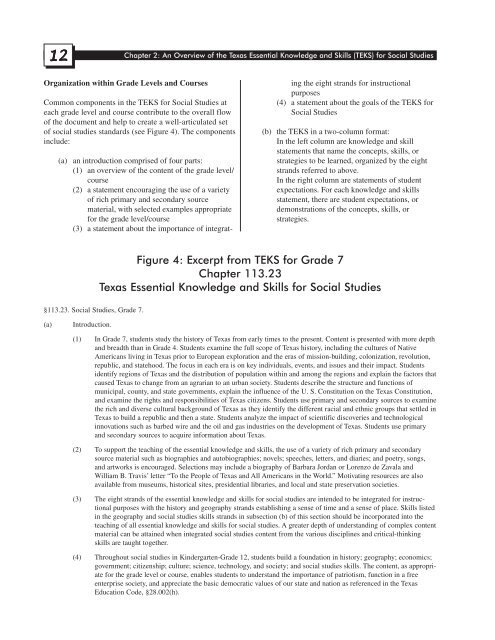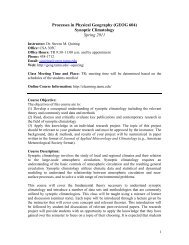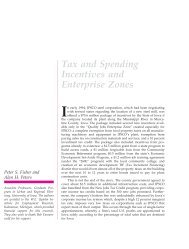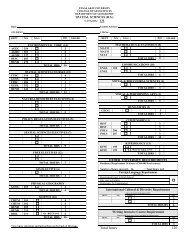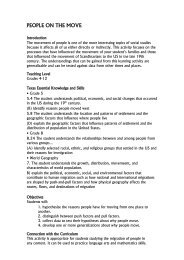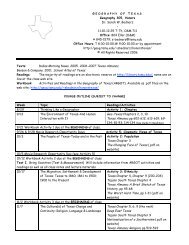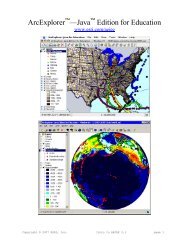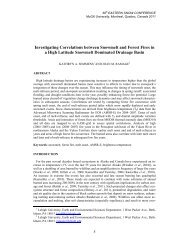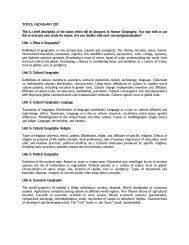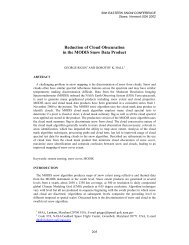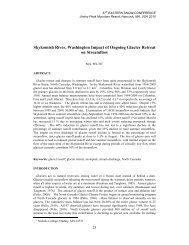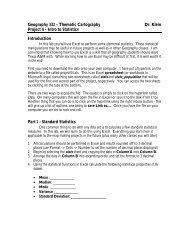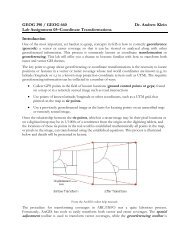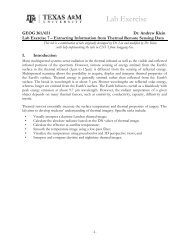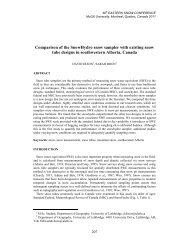Texas Social Studies Framework - Department of Geography ...
Texas Social Studies Framework - Department of Geography ...
Texas Social Studies Framework - Department of Geography ...
You also want an ePaper? Increase the reach of your titles
YUMPU automatically turns print PDFs into web optimized ePapers that Google loves.
12<br />
12<br />
Chapter 2: An Overview <strong>of</strong> the <strong>Texas</strong> Essential Knowledge and Skills (TEKS) for <strong>Social</strong> <strong>Studies</strong><br />
Organization within Grade Levels and Courses<br />
Common components in the TEKS for <strong>Social</strong> <strong>Studies</strong> at<br />
each grade level and course contribute to the overall flow<br />
<strong>of</strong> the document and help to create a well-articulated set<br />
<strong>of</strong> social studies standards (see Figure 4). The components<br />
include:<br />
(a) an introduction comprised <strong>of</strong> four parts:<br />
(1) an overview <strong>of</strong> the content <strong>of</strong> the grade level/<br />
course<br />
(2) a statement encouraging the use <strong>of</strong> a variety<br />
<strong>of</strong> rich primary and secondary source<br />
material, with selected examples appropriate<br />
for the grade level/course<br />
(3) a statement about the importance <strong>of</strong> integrat-<br />
§113.23. <strong>Social</strong> <strong>Studies</strong>, Grade 7.<br />
(a) Introduction.<br />
ing the eight strands for instructional<br />
purposes<br />
(4) a statement about the goals <strong>of</strong> the TEKS for<br />
<strong>Social</strong> <strong>Studies</strong><br />
(b) the TEKS in a two-column format:<br />
In the left column are knowledge and skill<br />
statements that name the concepts, skills, or<br />
strategies to be learned, organized by the eight<br />
strands referred to above.<br />
In the right column are statements <strong>of</strong> student<br />
expectations. For each knowledge and skills<br />
statement, there are student expectations, or<br />
demonstrations <strong>of</strong> the concepts, skills, or<br />
strategies.<br />
Figure 4: Excerpt from TEKS for Grade 7<br />
Chapter 113.23<br />
<strong>Texas</strong> Essential Knowledge and Skills for <strong>Social</strong> <strong>Studies</strong><br />
(1) In Grade 7, students study the history <strong>of</strong> <strong>Texas</strong> from early times to the present. Content is presented with more depth<br />
and breadth than in Grade 4. Students examine the full scope <strong>of</strong> <strong>Texas</strong> history, including the cultures <strong>of</strong> Native<br />
Americans living in <strong>Texas</strong> prior to European exploration and the eras <strong>of</strong> mission-building, colonization, revolution,<br />
republic, and statehood. The focus in each era is on key individuals, events, and issues and their impact. Students<br />
identify regions <strong>of</strong> <strong>Texas</strong> and the distribution <strong>of</strong> population within and among the regions and explain the factors that<br />
caused <strong>Texas</strong> to change from an agrarian to an urban society. Students describe the structure and functions <strong>of</strong><br />
municipal, county, and state governments, explain the influence <strong>of</strong> the U. S. Constitution on the <strong>Texas</strong> Constitution,<br />
and examine the rights and responsibilities <strong>of</strong> <strong>Texas</strong> citizens. Students use primary and secondary sources to examine<br />
the rich and diverse cultural background <strong>of</strong> <strong>Texas</strong> as they identify the different racial and ethnic groups that settled in<br />
<strong>Texas</strong> to build a republic and then a state. Students analyze the impact <strong>of</strong> scientific discoveries and technological<br />
innovations such as barbed wire and the oil and gas industries on the development <strong>of</strong> <strong>Texas</strong>. Students use primary<br />
and secondary sources to acquire information about <strong>Texas</strong>.<br />
(2) To support the teaching <strong>of</strong> the essential knowledge and skills, the use <strong>of</strong> a variety <strong>of</strong> rich primary and secondary<br />
source material such as biographies and autobiographies; novels; speeches, letters, and diaries; and poetry, songs,<br />
and artworks is encouraged. Selections may include a biography <strong>of</strong> Barbara Jordan or Lorenzo de Zavala and<br />
William B. Travis’ letter “To the People <strong>of</strong> <strong>Texas</strong> and All Americans in the World.” Motivating resources are also<br />
available from museums, historical sites, presidential libraries, and local and state preservation societies.<br />
(3) The eight strands <strong>of</strong> the essential knowledge and skills for social studies are intended to be integrated for instructional<br />
purposes with the history and geography strands establishing a sense <strong>of</strong> time and a sense <strong>of</strong> place. Skills listed<br />
in the geography and social studies skills strands in subsection (b) <strong>of</strong> this section should be incorporated into the<br />
teaching <strong>of</strong> all essential knowledge and skills for social studies. A greater depth <strong>of</strong> understanding <strong>of</strong> complex content<br />
material can be attained when integrated social studies content from the various disciplines and critical-thinking<br />
skills are taught together.<br />
(4) Throughout social studies in Kindergarten-Grade 12, students build a foundation in history; geography; economics;<br />
government; citizenship; culture; science, technology, and society; and social studies skills. The content, as appropriate<br />
for the grade level or course, enables students to understand the importance <strong>of</strong> patriotism, function in a free<br />
enterprise society, and appreciate the basic democratic values <strong>of</strong> our state and nation as referenced in the <strong>Texas</strong><br />
Education Code, §28.002(h).


